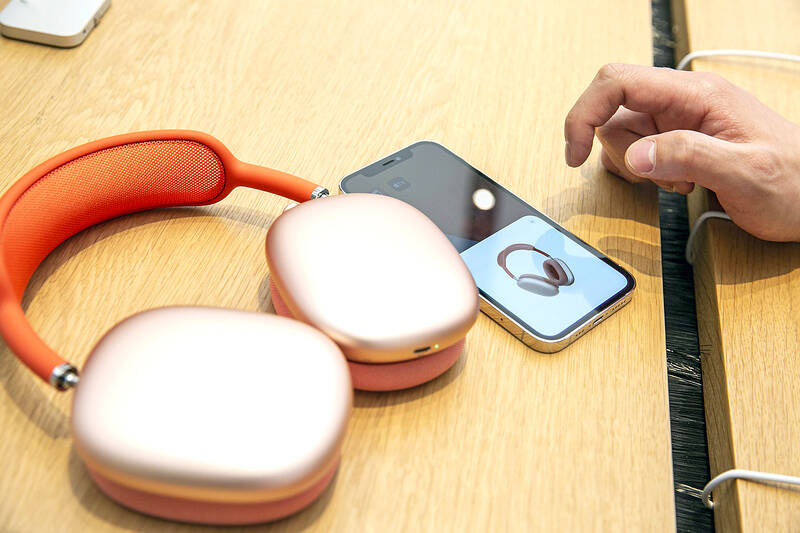Inspection fees for radio-frequency equipment are likely to be less than NT$750 or free if it can be confirmed that they are for personal use only, the National Communications Commission (NCC) said yesterday.
The proposed policy change would be discussed when the commission meets the mandated quorum of four to hold a meeting, the commission said. Currently, the seven-member commission has only three commissioners.
The commission made the statement after on Monday last week suspending the collection of the NT$750 equipment inspection fee due to complaints from consumers.

Photo: Bloomberg
Prior to the fee adjustment, only consumers bringing in three or more radio-frequency products from abroad would be asked to pay an equipment inspection fee of NT$600. Fees are waived for consumers bringing fewer devices, who are only required to upload to the NCC system product specifications and an affidavit declaring that the devices are for personal use only.
To avoid paying inspection fees, many online buying agents would only import two radio-frequency devices each time, which dramatically increased the workload of the NCC.
As such, the commission decided to raise the inspection fee to NT$750 to prevent exploitation of the loophole in the system, adding that the fee change applies to those importing two or fewer devices from abroad as well.
Last year, the commission began welcoming public input on the fee change, which was scheduled to take effect on Feb. 5.
“The fee adjustment was proposed to deter buying agents from exploiting the system, but we found that many consumers bought these products for personal use. As such, we would consider amending regulations. Inspection fees for those buying radio-frequency products for personal use should be waived or charged in a smaller amount. The decision would not be made until the commission meets the quorum to convene,” NCC Secretary-General Huang Wen-che (黃文哲) said.
The number of applications for radio-frequency equipment inspections rose to approximately 40,000 last year from 25,000 in 2023, NCC data showed.
Of the 40,000 cases, about 10,000 were related to the importation of sports cameras, wireless microphones and drones. They were followed by 8,000 pieces of camera and photography equipment, 6,000 Bluetooth and regular headsets, and 5,000 Meta virtual-reality headsets and glasses, the commission said.
The NCC said it had issued 366 payment slips since Feb. 5, with 322 people having paid. The remaining 44 have yet to pay the fee due to the suspension of the policy, it said.
The NCC would decide what to do with those who have paid the fees, Huang said.
He denied that the decision to roll back the measure was made because of political pressure.
The main purpose of the fee change is to ensure that buying agents follow the law, not to punish personal users, he said.
“We also have the responsibility to maintain the order of radio waves and protect user safety. People have problems with the way we carry out such missions, and we have to fix it,” he said, adding that the NCC might consider relaxing regulations for devices that would cause only minor interference, as well as better ways to identify personal users and buying agents.

The manufacture of the remaining 28 M1A2T Abrams tanks Taiwan purchased from the US has recently been completed, and they are expected to be delivered within the next one to two months, a source said yesterday. The Ministry of National Defense is arranging cargo ships to transport the tanks to Taiwan as soon as possible, said the source, who is familiar with the matter. The estimated arrival time ranges from late this month to early next month, the source said. The 28 Abrams tanks make up the third and final batch of a total of 108 tanks, valued at about NT$40.5 billion

Two Taiwanese prosecutors were questioned by Chinese security personnel at their hotel during a trip to China’s Henan Province this month, the Mainland Affairs Council (MAC) said yesterday. The officers had personal information on the prosecutors, including “when they were assigned to their posts, their work locations and job titles,” MAC Deputy Minister and spokesman Liang Wen-chieh (梁文傑) said. On top of asking about their agencies and positions, the officers also questioned the prosecutors about the Cross-Strait Joint Crime-Fighting and Judicial Mutual Assistance Agreement, a pact that serves as the framework for Taiwan-China cooperation on combating crime and providing judicial assistance, Liang

A group from the Taiwanese Designers in Australia association yesterday represented Taiwan at the Midsumma Pride March in Melbourne. The march, held in the St. Kilda suburb, is the city’s largest LGBTQIA+ parade and the flagship event of the annual Midsumma Festival. It attracted more than 45,000 spectators who supported the 400 groups and 10,000 marchers that participated this year, the association said. Taiwanese Designers said they organized a team to march for Taiwan this year, joining politicians, government agencies, professionals and community organizations in showing support for LGBTQIA+ people and diverse communities. As the first country in Asia to legalize same-sex

MOTIVES QUESTIONED The PLA considers Xi’s policies toward Taiwan to be driven by personal considerations rather than military assessment, the Epoch Times reports Chinese President Xi Jinping’s (習近平) latest purge of the Chinese People’s Liberation Army (PLA) leadership might have been prompted by the military’s opposition to plans of invading Taiwan, the Epoch Times said. The Chinese military opposes waging war against Taiwan by a large consensus, putting it at odds with Xi’s vision, the Falun Gong-affiliated daily said in a report on Thursday, citing anonymous sources with insight into the PLA’s inner workings. The opposition is not the opinion of a few generals, but a widely shared view among the PLA cadre, the Epoch Times cited them as saying. “Chinese forces know full well that